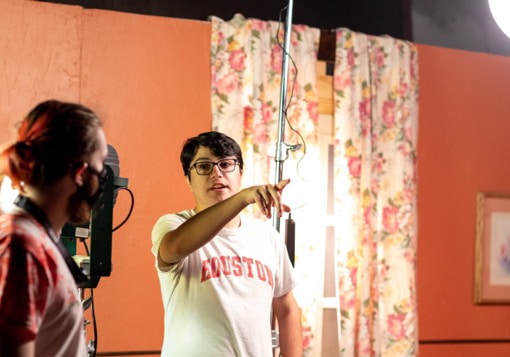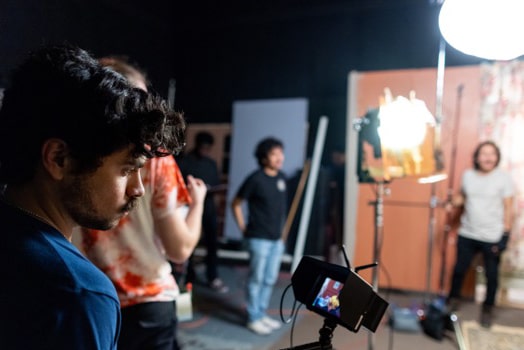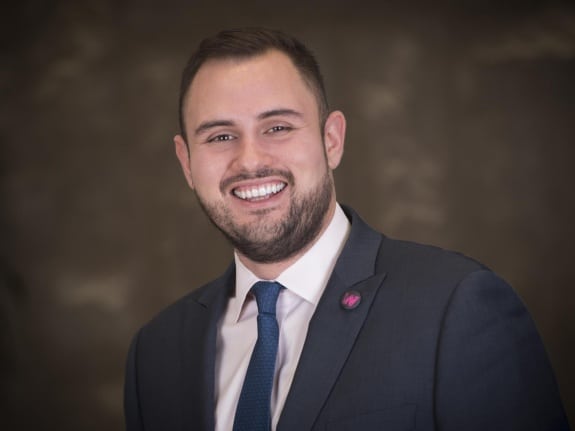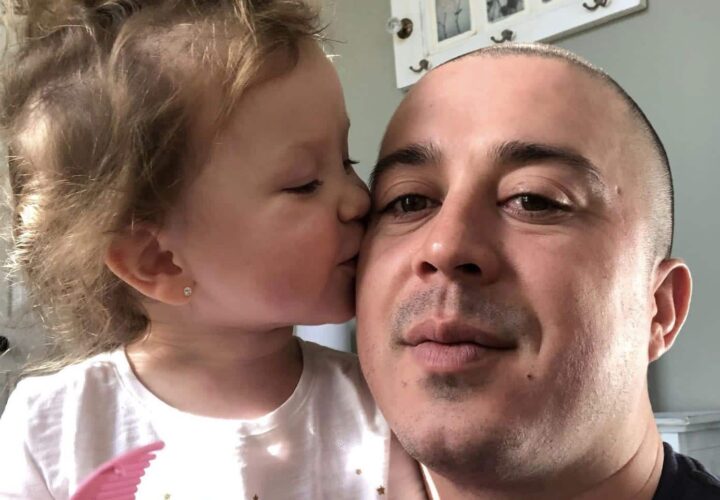Latinos have a high risk of Alzheimer's — and very little presence in Alzheimer's clinical trials. A group of film students at the University of Houston is channeling their creativity into an effort to reduce stigma and boost awareness.
This article is part of the series Diversity & Dementia, produced by Being Patient with support provided by Eisai.
A man in a bright yellow shirt sits on his living room couch watching a soccer game when suddenly his young son and daughter burst into the room.
“Papa, papa!” the girl says.
“Not now, I’m watching the game,” the man in the yellow shirt responds.
“But abuelo’s in the neighbor’s lawn,” his son interjects as his younger sister looks are him worried.
“He won’t leave,” she adds.
This is how the first episode of the University of Houston student-produced telenovela series, “Recuerdos de Mi Abuelo” (“Memories of My Grandfather”) begins.
The five-episode series tells the story of an aging family patriarch, Don Leonel, who is diagnosed with Alzheimer’s disease, and the challenges he and his family face.
Students in the University of Houston’s Jack J. Valenti School of Communication and Department of Psychology produced, wrote, and directed the bilingual soap opera which premiered in bilingual local screenings in November 2022 and February 2023, off campus at a community center in east Harris County — a majority Hispanic/Latino neighborhood. The purpose of the project was to educate people in the Hispanic/Latino community about the risk of dementia and Alzheimer’s disease.
Reaching out to communities most at risk
Over 6 million people in the United States have Alzheimer’s disease but the illness impacts some groups far more than others. Latinos are 50 percent more likely to develop the illness compared to non-Hispanics, according to one recent report.
Latinos are also expected to have the greatest increase in Alzheimer’s cases given how rapidly their older population is expected to grow over the next forty years. By 2060, the older adult Latino population is expected to almost quadruple. And, this heightened risk of Alzheimer’s is even more pronounced in some Latino communities compared to others.
This is especially true in the four counties that make the Rio Grande Valley, a rural Latino community in southern Texas. There, people who are 65 years old and up are nearly twice as likely to develop dementia as their counterparts in other parts of the country, according to Medicare data. But despite this increased risk, Latinos still only account of 2 percent of clinical trials related to Alzheimer’s disease and other dementias.
Scientists are trying to boost inclusive research efforts in order to figure out why Latinos have an increased risk for developing Alzheimer’s including genetics, lifestyle or environment.

The El Faro Health & Therapeutics Center an Alzheimer’s research clinic in Starr County, Texas is one place working towards more inclusive studies and screenings for the disease. But more work needs to be done.
That’s why, at the students’ screenings, not only did the audience get to watch the telenovelas, but the screenings were followed by expert perspective about Alzheimer’s from a panel made up of UH assistant professor of psychology Luis Medina and his research associates.
Also during the telenovela screenings, older members of the audience had the opportunity to sign up for a cognitive health screening with a clinician a few weeks later. During these health screenings, doctors will sit down with the community member to discuss personal risk factors for cognitive decline and dementia, and to learn more, through conversation, questionnaire, and brief paper-and-pencil tests, about any concerns the person might have their their memory or other cognitive abilities.
Lights, camera, awareness
“In order to help reduce health disparities, we need to involve these communities in the decision-making process,” Medina told the University of Houston. “There are various barriers to getting involved in research, including health literacy or what people actually know about Alzheimer’s disease. In the Hispanic/Latino communities, it is often thought of as just a part of aging.”
This is a big topic that “Recuerdos de Mi Abuelo” touches on.
In the first episode, Don Leonel worries his grandchildren when he mistakes his neighbor’s yard for his own, mixes up shaving gel and toothpaste, and struggles to tie his shoes.
Don Leonel denies that he is having any issues and his son Armando just chalks up his father’s forgetfulness to getting older. At the repeated requests of his wife and children, Armando eventually brings his father to a Latino health clinic where a doctor diagnoses him with Alzheimer’s.
“I’ve seen it firsthand, how it affects the family,” Jesus O. Pineda, Pineda, the actor who plays the character of David, told the University of Houston of Alzheimer’s disease. Pineda, at one point, worked in a Latino/Hispanic family health clinic. “It’s not necessarily the grandpa or the people who are suffering from Alzheimer’s that come to us for help initially. It’s usually the son or the grandson that comes. Little by little, they try to get the actual patient to come in and seek help.”
The cast and crew’s personal experience with Alzheimer’s makes the series so powerful.
The series also confronts the cultural barriers that Latinos might face when it comes to recognizing Alzheimer’s signs and educate the audience on what to look out for. In the second episode, the physician treating Don Leonel lists tricky ways that Alzheimer’s pay present itself besides memory loss like difficulty solving problems, difficulty doing day-to-day tasks, and confusion with time and location.
Following the screenings, many of the students have continued to stay involved with the project by getting the word out in the Houston community about the series, according to a spokesperson at the university. Now, the young filmmakers are working on another telenovela bilingual screening with Precinct 4, west Harris County for this spring, with cognitive screening sign-up and all.




